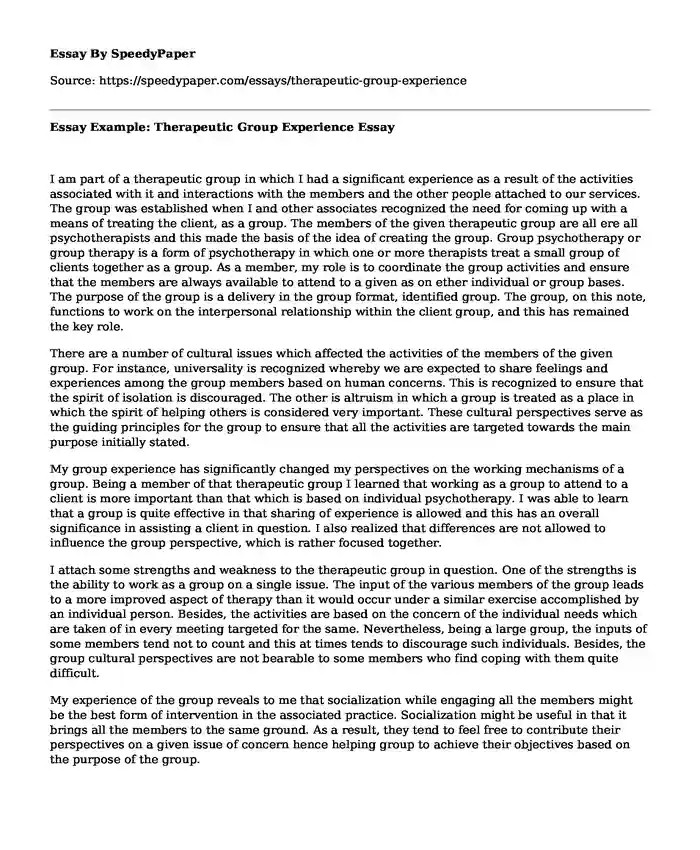
| Type of paper: | Course work |
| Categories: | Psychology Relationship |
| Pages: | 3 |
| Wordcount: | 678 words |
I am part of a therapeutic group in which I had a significant experience as a result of the activities associated with it and interactions with the members and the other people attached to our services. The group was established when I and other associates recognized the need for coming up with a means of treating the client, as a group. The members of the given therapeutic group are all ere all psychotherapists and this made the basis of the idea of creating the group. Group psychotherapy or group therapy is a form of psychotherapy in which one or more therapists treat a small group of clients together as a group. As a member, my role is to coordinate the group activities and ensure that the members are always available to attend to a given as on ether individual or group bases. The purpose of the group is a delivery in the group format, identified group. The group, on this note, functions to work on the interpersonal relationship within the client group, and this has remained the key role.
There are a number of cultural issues which affected the activities of the members of the given group. For instance, universality is recognized whereby we are expected to share feelings and experiences among the group members based on human concerns. This is recognized to ensure that the spirit of isolation is discouraged. The other is altruism in which a group is treated as a place in which the spirit of helping others is considered very important. These cultural perspectives serve as the guiding principles for the group to ensure that all the activities are targeted towards the main purpose initially stated.
My group experience has significantly changed my perspectives on the working mechanisms of a group. Being a member of that therapeutic group I learned that working as a group to attend to a client is more important than that which is based on individual psychotherapy. I was able to learn that a group is quite effective in that sharing of experience is allowed and this has an overall significance in assisting a client in question. I also realized that differences are not allowed to influence the group perspective, which is rather focused together.
I attach some strengths and weakness to the therapeutic group in question. One of the strengths is the ability to work as a group on a single issue. The input of the various members of the group leads to a more improved aspect of therapy than it would occur under a similar exercise accomplished by an individual person. Besides, the activities are based on the concern of the individual needs which are taken of in every meeting targeted for the same. Nevertheless, being a large group, the inputs of some members tend not to count and this at times tends to discourage such individuals. Besides, the group cultural perspectives are not bearable to some members who find coping with them quite difficult.
My experience of the group reveals to me that socialization while engaging all the members might be the best form of intervention in the associated practice. Socialization might be useful in that it brings all the members to the same ground. As a result, they tend to feel free to contribute their perspectives on a given issue of concern hence helping group to achieve their objectives based on the purpose of the group.
References
Heilman, D. (2017). The Potential Role for Group Psychotherapy in the Treatment of Internalized Homophobia in Gay Men. International Journal Of Group Psychotherapy, 68(1), 56-68. doi: 10.1080/00207284.2017.1315585
Knapp, C., & Gipple, J. (2015). Windhorse Treatment: Group Dynamics Within Therapeutic Environments. Group, 39(3), 199. doi: 10.13186/group.39.3.0199
Korb, M., & Themis, S. (1980). The Importance of Group Process in Gestalt Therapy. The Journal For Specialists In Group Work, 5(1), 36-40. doi: 10.1080/15496295.1980.11728595
Nakimuli-Mpungu, E., Okello, J., Kinyanda, E., Alderman, S., Nakku, J., & Alderman, J. et al. (2013). The impact of group counseling on depression, post-traumatic stress and function outcomes: A prospective comparison study in the Peter C. Alderman trauma clinics in northern Uganda. Journal Of Affective Disorders, 151(1), 78-84. doi: 10.1016/j.jad.2013.05.055
Cite this page
Essay Example: Therapeutic Group Experience. (2022, Jul 18). Retrieved from https://speedypaper.net/essays/therapeutic-group-experience
Request Removal
If you are the original author of this essay and no longer wish to have it published on the SpeedyPaper website, please click below to request its removal:
- Definition of Man Flu Essay Example
- Equal Rights for Men and Women - Essay Example
- Essay Sample on How Media Influences Public Opinion on Smoking
- The Character of Offred in The Handmaid's Tale, Literary Essay Sample
- Essay Example on the Topic of Communication and Fashion
- Essay Sample on Research Paper Writing
- Essay Example - DateTechnology Regulation
Popular categories




